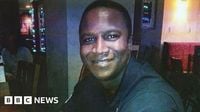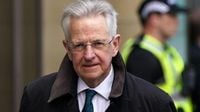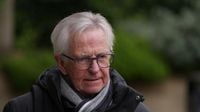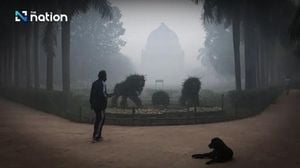Lord Bracadale has resigned as chairperson of the Sheku Bayoh inquiry, marking a dramatic turn in one of Scotland’s most closely watched public investigations. His departure comes more than two months after initially refusing to step down, following mounting concerns over his impartiality due to private meetings with the family of Sheku Bayoh. The inquiry, which has been underway since November 2020, has sought to uncover the full circumstances surrounding Bayoh’s death in police custody in Kirkcaldy, Fife, in May 2015.
Sheku Bayoh, a 31-year-old father of two, died after being restrained by six police officers on the streets of Kirkcaldy. The incident, which began after members of the public reported Bayoh carrying a knife and behaving erratically, quickly escalated when police arrived. Although Bayoh was not carrying the knife when officers confronted him, a violent struggle ensued, ending with Bayoh losing consciousness and later dying in hospital. The Crown Office ultimately decided not to prosecute the officers involved, but the case’s complexity and the public’s demand for answers led to the establishment of a full public inquiry.
From its outset, the inquiry has delved into not only the immediate events leading to Bayoh’s death, but also the police’s handling of the aftermath, the official investigation, and the critical question of whether race played a role. The issue of institutional racism within Police Scotland was brought to the fore during the proceedings, with former chief constable Sir Iain Livingstone openly stating that the force was institutionally racist, according to BBC News.
Lord Bracadale’s resignation was confirmed in a letter to Deputy First Minister Kate Forbes. In his letter, Bracadale wrote, “As the judicial review process developed it became clear that the concerns about my conduct had not been allayed by my decision and that the criticisms have persisted. As a result, it is now clear to me that many of the core participants have lost confidence in my conduct of the Inquiry to such an extent that it cannot be retrieved.”
The controversy that led to Bracadale’s departure began in April 2025, when the Scottish Police Federation (SPF)—which represents rank and file officers—raised concerns about his impartiality. The SPF pointed specifically to at least five private meetings Bracadale held with Bayoh’s family since the inquiry began, during which evidence was discussed. The Federation argued these meetings created an “appearance of bias.”
In June, a formal application for Bracadale’s recusal was heard at a procedural hearing in Edinburgh. Despite these challenges, Bracadale announced on August 13, 2025, that he would not step down. The SPF, however, pressed ahead, seeking a judicial review of his decision to remain in post—a review that was scheduled to be heard the following month. Ultimately, Bracadale concluded that the erosion of confidence among core participants, including the SPF and others, made his position untenable.
Reflecting on his decision, Bracadale explained that his meetings with Bayoh’s family were intended to “obtain and retain their confidence in the Inquiry and their engagement with it.” He noted that the families had “lost confidence” in Police Scotland, the Police Investigations and Review Commissioner, and the Crown Office and Procurator Fiscal Service. “As the Inquiry progressed it became apparent at various points that they were losing confidence in the Inquiry and were likely to cease engaging with it,” Bracadale wrote. “I consider that if I had not had meetings with members of the families, it is likely that they would have walked out of the Inquiry.”
Yet, Bracadale acknowledged the cost of these actions. “I very much regret that my conduct in relation to meeting the families for what I considered to be a reasonable purpose of maintaining their engagement with the Inquiry has led to a loss of confidence by other core participants in my position as Chair,” he stated in his resignation letter, as reported by STV News and BBC News.
The SPF, for its part, welcomed the resignation, albeit with regret for the disruption it caused. General secretary David Kennedy said, “It is unfortunate for all those involved in the inquiry that this situation has occurred. The meetings between Lord Bracadale and the family of Sheku Bayoh had created an appearance of bias. We look forward to the final stages of the inquiry and bringing this matter to a conclusion.”
Bayoh’s family, meanwhile, expressed devastation at Bracadale’s resignation. Their lawyer, Aamer Anwar, speaking to BBC Scotland News, described the situation as “unprecedented,” adding, “Over the last three years, evidence at the Inquiry exposed the truth of what happened to Sheku Bayoh, the systemic failures, the failure to investigate racism and the devastating and deadly force used on an unarmed black man. For the Bayoh family, an unholy trinity of the Police, SPF and Crown Office have tried their very best to shut down this Inquiry, but they cannot hide from the truth.” He also noted that Bayoh’s family would consider their position in light of the resignation, with a press conference scheduled in Glasgow.
The Scottish Government was quick to thank Lord Bracadale for his service, emphasizing its commitment to uncovering the facts. A spokesperson stated, “Ministers would like to thank Lord Bracadale for his work on this important public inquiry. The Scottish Government is committed to establishing the facts surrounding the circumstances leading to Mr Bayoh’s death. We will now urgently consider the best way forward.”
Bracadale’s resignation comes at a critical juncture for the inquiry. All evidence has now been presented, with the next stages set to include closing submissions and the preparation of the final report. In his resignation letter, Bracadale recommended that a new chair be appointed, stressing that all existing evidence—recorded and transcribed—would be available to them. “I am concerned that the majority of core participants would have no confidence in the findings of any report prepared by me. I consider that that, in turn, would be likely to have a damaging effect on public confidence in the findings of a report prepared by me and recommendations flowing from it. In my view the best interests of the inquiry would be served by the appointment of a new chair,” he wrote.
The inquiry’s terms of reference have always included a focus on the role of race in Bayoh’s death and the subsequent investigations. The question of institutional racism within Scottish policing, highlighted by Sir Iain Livingstone’s candid admission, remains central to the inquiry’s work. The public scrutiny and emotional weight carried by this case have only intensified as the inquiry has unfolded.
For now, the immediate challenge lies with the Scottish Government—to appoint a new chair who can restore confidence among all parties and guide the inquiry through its final, decisive stages. The hope, as expressed by both officials and those closest to Sheku Bayoh, is that the truth will ultimately prevail, and that the inquiry’s findings will carry the full weight of public trust.






